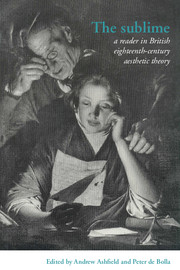Book contents
- Frontmatter
- Contents
- List of Abbreviations
- Introduction
- Part I The Longinian tradition
- 1 Dionysius Longinus on the sublime (1743)
- 2 Remarks on a book entitled, Prince Arthur (1696)
- 3 The advancement and reformation of modern poetry (1701)
- 4 The grounds of criticism in poetry (1704)
- 5 Essays upon several subjects (1716)
- 6 A miscellany of ingenious thoughts (1721)
- 7 An essay on the theory of painting (1725)
- 8 Reflections on the nature and property of languages (London 1731)
- 9 The works (1735)
- 10 Lectures on poetry (1742)
- Part II Rhapsody to rhetoric
- Part III Irish Perspectives
- Part IV The Aberdonian Enlightenment
- Part V Edinburgh and Glasgow
- Part VI From the Picturesque to the Political
- Sources and further reading
3 - The advancement and reformation of modern poetry (1701)
Published online by Cambridge University Press: 05 June 2012
- Frontmatter
- Contents
- List of Abbreviations
- Introduction
- Part I The Longinian tradition
- 1 Dionysius Longinus on the sublime (1743)
- 2 Remarks on a book entitled, Prince Arthur (1696)
- 3 The advancement and reformation of modern poetry (1701)
- 4 The grounds of criticism in poetry (1704)
- 5 Essays upon several subjects (1716)
- 6 A miscellany of ingenious thoughts (1721)
- 7 An essay on the theory of painting (1725)
- 8 Reflections on the nature and property of languages (London 1731)
- 9 The works (1735)
- 10 Lectures on poetry (1742)
- Part II Rhapsody to rhetoric
- Part III Irish Perspectives
- Part IV The Aberdonian Enlightenment
- Part V Edinburgh and Glasgow
- Part VI From the Picturesque to the Political
- Sources and further reading
Summary
Part I. Chapter V
That Passion is the chief Thing in Poetry, and that all Passion is either ordinary Passion, or Enthusiasm
But before we proceed, let us define poetry; which is the first time that a definition has been given of that noble art: for neither ancient nor modern critics have defined poetry in general.
Poetry then is an imitation of nature, by a pathetic and numerous speech. Let us explain it.
As poetry is an art, it must be an imitation of nature. That the instrument with which it makes its imitation, is speech, need not be disputed. That that speech must be musical, no one can doubt: for numbers distinguish the parts of poetic diction, from the periods of prose. Now numbers are nothing but articulate sounds, and their pauses measured by their proper proportions of time. And the periods of prosaic diction are articulate sounds, and their pauses unmeasured by such proportions. That the speech, by which poetry makes its imitation, must be pathetic, is evident; for passion is still more necessary to it than harmony. For harmony only distinguishes its instrument from that of prose, but passion distinguishes its very nature and character. For, therefore, poetry is poetry, because it is more passionate and sensual than prose. A discourse that is writ in very good numbers, if it wants passion, can be but measured prose.
- Type
- Chapter
- Information
- The SublimeA Reader in British Eighteenth-Century Aesthetic Theory, pp. 32 - 34Publisher: Cambridge University PressPrint publication year: 1996



